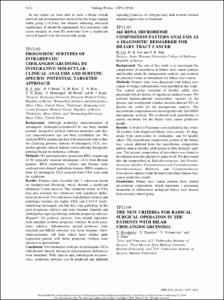Prognostic subclasses of intrahepatic cholangiocarcinoma by integrative molecular-clinical analylsis and potential targeted approach.
- Alternative Author(s)
- Ahn, Keun Soo; Kim, Yong Hoon; Kim, Tae Seok; Kang, Koo Jeong; Kang, Yu Na
- Journal Title
- HPB
- ISSN
- 1365-182X
- Issued Date
- 2018
- Abstract
- Background: Although molecular characterization of intrahepatic cholangiocarcinoma(CCA) has been studied recently, integrative analysis between molecular and clinical characterization has not been established yet. We analyzed RNA sequencing data with annotated clinical data for clarifying genomic features of intrahepatic CCA, molecular specific clinical features and evaluating therapeutic potential based on molecular subtypes.
Methods: We performed next generation RNA sequencing of 30 surgically resected intrahepatic CCA from Korean patients. RNA expression, variants and fusions were analyzed with clinical, pathologic features. RNA sequences from 32 intrahepatic CCA resected from USA were used for validation.
Results: Patients were classified into 2 subclasses based on unsupervised clustering, which showed a significant difference 5-year survival. The validation cohort of USA data also revealed two subclasses with significant differences in survival. Two subclasses had different clinical and pathologic features for higher CEA and CA19-9 levels, underlying cholangitis and bile duct type pathology in the poor prognostic subclass and more frequent hepatitis and cholangiolar type of pathology in better prognostic subclass (Figure1). On pathway analysis, liver related signatures were enriched in better prognosis subclass. In poor prognosis subclass, inflammation related pathways were enriched and KRAS mutation was more frequent. Cholangiocarcinoma cell lines which have similar gene expression pattern with better prognosis subclass were sensitive to gemcitabine.
Conclusion: Two molecular subtypes of intrahepatic CCA with distinct clinical, biological and prognostic differences were identified. With clinical and pathological characteristics, molecular subtypes can be predicted and different signaling pathways of subtypes may lead to more rational targeted approaches to treatment.
- Publisher
- School of Medicine (의과대학)
- Citation
- K.S. Ahn et al. (2018). Prognostic subclasses of intrahepatic cholangiocarcinoma by integrative molecular-clinical analylsis and potential targeted approach. HPB, 20(suppl.2), S312–S312. doi: 10.1016/j.hpb.2018.06.326
- Type
- Article
- ISSN
- 1365-182X
- Appears in Collections:
- 1. School of Medicine (의과대학) > Dept. of Pathology (병리학)
1. School of Medicine (의과대학) > Dept. of Surgery (외과학)
- 파일 목록
-
-
Download
 oak-2018-0904.pdf
기타 데이터 / 43.45 kB / Adobe PDF
oak-2018-0904.pdf
기타 데이터 / 43.45 kB / Adobe PDF
-
Items in Repository are protected by copyright, with all rights reserved, unless otherwise indicated.